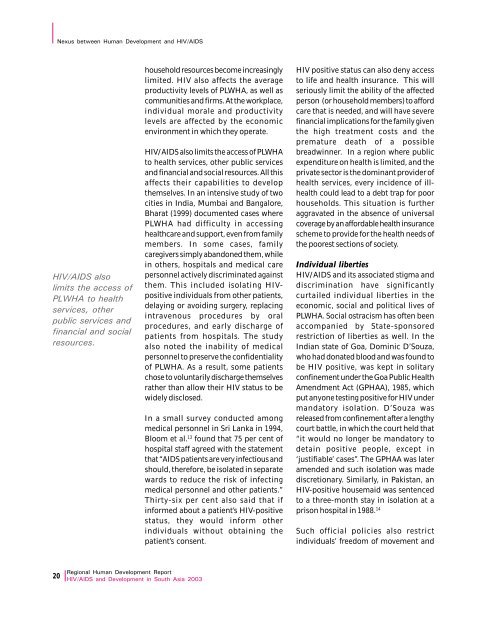Download Report - UNDP Asia-Pacific Regional Centre - United ...
Download Report - UNDP Asia-Pacific Regional Centre - United ...
Download Report - UNDP Asia-Pacific Regional Centre - United ...
Create successful ePaper yourself
Turn your PDF publications into a flip-book with our unique Google optimized e-Paper software.
Nexus between Human Development and HIV/AIDSHIV/AIDS alsolimits the access ofPLWHA to healthservices, otherpublic services andfinancial and socialresources.household resources become increasinglylimited. HIV also affects the averageproductivity levels of PLWHA, as well ascommunities and firms. At the workplace,individual morale and productivitylevels are affected by the economicenvironment in which they operate.HIV/AIDS also limits the access of PLWHAto health services, other public servicesand financial and social resources. All thisaffects their capabilities to developthemselves. In an intensive study of twocities in India, Mumbai and Bangalore,Bharat (1999) documented cases wherePLWHA had difficulty in accessinghealthcare and support, even from familymembers. In some cases, familycaregivers simply abandoned them, whilein others, hospitals and medical carepersonnel actively discriminated againstthem. This included isolating HIVpositiveindividuals from other patients,delaying or avoiding surgery, replacingintravenous procedures by oralprocedures, and early discharge ofpatients from hospitals. The studyalso noted the inability of medicalpersonnel to preserve the confidentialityof PLWHA. As a result, some patientschose to voluntarily discharge themselvesrather than allow their HIV status to bewidely disclosed.In a small survey conducted amongmedical personnel in Sri Lanka in 1994,Bloom et al. 13 found that 75 per cent ofhospital staff agreed with the statementthat “AIDS patients are very infectious andshould, therefore, be isolated in separatewards to reduce the risk of infectingmedical personnel and other patients.”Thirty-six per cent also said that ifinformed about a patient’s HIV-positivestatus, they would inform otherindividuals without obtaining thepatient’s consent.HIV positive status can also deny accessto life and health insurance. This willseriously limit the ability of the affectedperson (or household members) to affordcare that is needed, and will have severefinancial implications for the family giventhe high treatment costs and thepremature death of a possiblebreadwinner. In a region where publicexpenditure on health is limited, and theprivate sector is the dominant provider ofhealth services, every incidence of illhealthcould lead to a debt trap for poorhouseholds. This situation is furtheraggravated in the absence of universalcoverage by an affordable health insurancescheme to provide for the health needs ofthe poorest sections of society.Individual libertiesHIV/AIDS and its associated stigma anddiscrimination have significantlycurtailed individual liberties in theeconomic, social and political lives ofPLWHA. Social ostracism has often beenaccompanied by State-sponsoredrestriction of liberties as well. In theIndian state of Goa, Dominic D’Souza,who had donated blood and was found tobe HIV positive, was kept in solitaryconfinement under the Goa Public HealthAmendment Act (GPHAA), 1985, whichput anyone testing positive for HIV undermandatory isolation. D’Souza wasreleased from confinement after a lengthycourt battle, in which the court held that“it would no longer be mandatory todetain positive people, except in‘justifiable’ cases”. The GPHAA was lateramended and such isolation was madediscretionary. Similarly, in Pakistan, anHIV-positive housemaid was sentencedto a three-month stay in isolation at aprison hospital in 1988. 14Such official policies also restrictindividuals’ freedom of movement and20<strong>Regional</strong> Human Development <strong>Report</strong>HIV/AIDS and Development in South <strong>Asia</strong> 2003
















